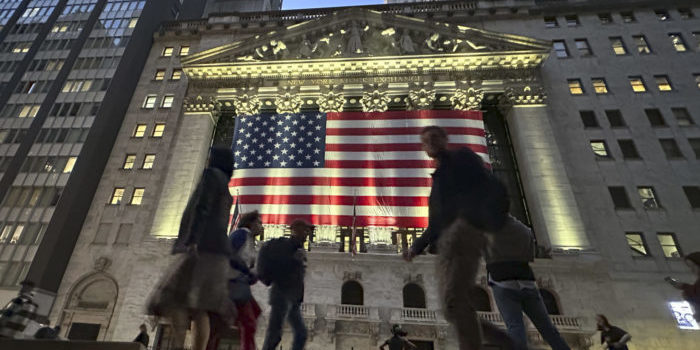(Deroy Murdock, Headline USA) More carrots, please!
Feeling flogged by sticks, Wall Street greeted President Donald J. Trump’s Liberation Day with a bellowing Bronx cheer.
On Wednesday, Trump unveiled 10% across-the-board tariffs on all imports, plus reciprocal taxes tailored to foil foreign tariffs on U.S. goods. Financial markets opened Thursday and swiftly wilted.
After China slapped a retaliatory 34% tariff on American products early Friday, the key indices dropped like bombs from a B-52. The Dow Jones Industrial Average tumbled 2,231 points (5.50%). The S&P 500 plunged 322 points (5.97%). The NASDAQ plummeted 962 points (5.82%).
If the USA must absorb tariffs as long-run expenses (rather than watch Trump use them, short-term, to lean on foreign leaders), they should strike a vibrant, very special economy. Instead, tariffs are smacking Americans still anemic from Bidenomics.
Nonetheless, Trump predicted Wednesday in the Rose Garden: “We will supercharge our domestic industrial base.” He pledged, “Jobs and factories will come roaring back into our country,” along with “more production at home.”
Hooray!
But where will companies find the cash to repatriate foreign assembly lines, expand domestic operations, and otherwise reinvigorate U.S. manufacturing — especially after $6.6 trillion in market value evaporated on Thursday and Friday?
Trump’s stick-heavy recipe lacks one key ingredient: Carrots.
The all-American industrial renaissance that Trump rightly envisions would arrive sooner, if lower taxes, instant amortization, and other catalysts were humming within days, not whenever Congressional Republicans get around to them.
From twisting arms on Capitol Hill to rallying taxpayers across America, Trump should push tax cuts as hard as he presses tariffs. Indeed, tax cuts should have come first.
What a pity that Trump did not promote these policies in reverse:
First, slash taxes and let embattled American citizens and companies keep more of their money. A boom promptly would have erupted.
Second, as output soared, Trump should have invited world leaders to the White House and proposed 0% tariffs among these trade partners. If they agreed, Hallelujah! The world would enjoy pure, free trade.
Third, if these countries rebuffed Trump’s offer, however, he then could have hurled reciprocal tariffs like lightning bolts from atop the moral highlands.
Instead, uncertainty remains the enemy of growth. This suggested timetable would have furnished answers, not today’s burning questions:
What tax rate will corporations pay after January 1? How quickly may a factory amortize a brand-new boiler? Will Canadian aluminum prices include a 25%, 10%, or 0% tariff?
As of second quarter 2025, nobody knows.
Congressional Republicans appear to be coalescing around One Big, Beautiful Bill, brimming with permanently low Trump-45 tax rates, a new 15% corporate tax (down from 21%) for domestic manufacturers, and other vital reforms.
Alas, Republicans lack the urgency that this moment demands. Senators, in particular, discuss tax cuts by Memorial Day or “later this year.” Others would postpone Trump’s repeal of taxes on tips, overtime, and Social Security benefits until 2026!
This is dangerous.
These tax cuts should be passed and signed by May Day. Tax relief should take effect that morning, if not retroactively to January 20 or even January 1, 2025. At once, this would leave additional money in American wallets. Businesses would bloom among lower tax rates, more generous deductions, and, ideally, immediate depreciation for factory construction and equipment.
A burgeoning economy would position Republicans to keep Congress. However, GOP dithering on tax reduction could delay prosperity and buoy Democrats’ mid-term prospects.
Meanwhile, some Republicans reportedly are considering hiking tax rates up to 40% on $1-million-plus earners. It is abominable that any Republican would parrot Bernie Sanders’ chief talking point: Tax millionaires and billionaires — good and hard.
Trump’s policy is an audacious wager.
Best-case scenario: Scores of nations mirror Israel’s and Vietnam’s ambitions to negotiate with Trump and set reciprocal tariffs at 0%.
Worst-case scenario: Trade War I explodes, nations dig financial trenches, and attack each other with tariff gas.
Mr. President, let’s avoid that second destination.
More carrots, please!
The above column does not necessarily reflect the editorial views of Headline USA.
Deroy Murdock is a Manhattan-based Fox News Contributor.

